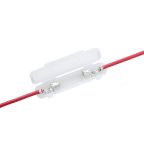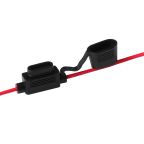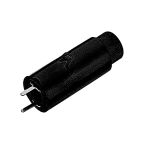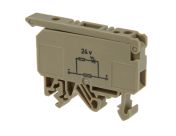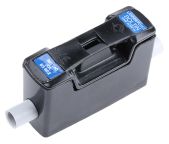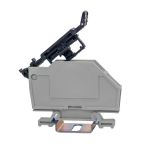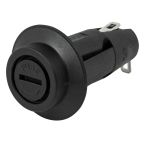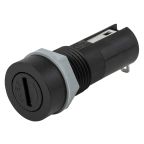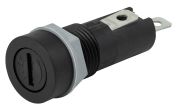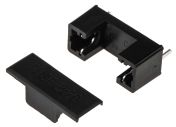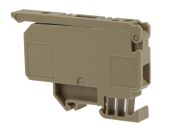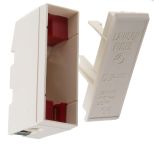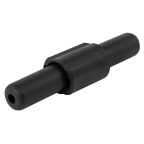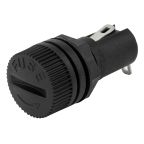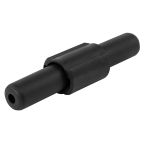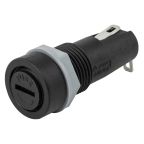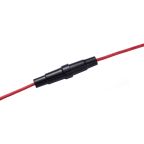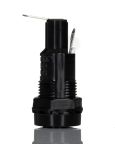Fuse Holders
Fuse holders are devices used for retaining, protecting, and mounting fuses. Fuse holders come in a range of styles, each designed to suit a specific style of a fuse. Fuse holders can be categorised by their attachment or mounting type.
RS offers an extensive range of high-quality devices for industrial, commercial, and domestic use. All are sourced from industry-leading brands, including Eaton, Littelfuse, Mersen, and our in-house brand, RS PRO.
How Does Fuse Holder Work?
A fuse holder works by securely housing a fuse, providing both mechanical support and electrical connection within a circuit. When a fuse is inserted into the holder, the holder’s conductive elements make contact with the fuse terminals, creating a complete circuit. If an overcurrent occurs, the fuse will blow, breaking the circuit and preventing damage to the connected equipment. The fuse holder ensures the fuse remains in place under various conditions, protecting it from environmental factors and ensuring easy access for maintenance or replacement.
What Types of Fuse Holders Are Available?
Fuse holders vary depending on the type of fuse they are designed to accommodate, as well as the application and environment they’ll be used in. Some of the most common types you will find are:
- Base Mount: The base of the holder is usually attached to a surface by fixing screws in the centre of the base. Typically used with cartridge fuses.
- Inline: Inline fuse holder provides housing for a fuse in a wiring circuit. A cable or wire is attached at each end of the holder, making the in-line connection easy. Often used in vehicle electrical circuits with mini-blade fuses.
- Panel Mount: Specifically designed for mounting directly onto or in an electrical panel, panel mount fuse holders come in various forms to accommodate different fuse types. Two main types include rectangular snap-in and cylindrical tube screw-in. Additionally, panel mount blade fuse holders and ATC fuse holder panel mounts are available for applications requiring secure and accessible fuse installation. Flush mount fuse holders are also used for sleek, low-profile installations in panels. Cap styles can be manual, slotted, or finger grip.
- Rail Mount: Rail mount holders are specifically designed to be mounted to DIN mount terminal blocks, meaning that they feature a slot for the rail to attach to somewhere in the body of the fuse holder. Rail mount fuse holders can vary according to a few different characteristics, including voltage and current rating, number of poles, and terminal type.
- Bottle Fuse: A holder for cylindrical bottle fuses, usually with a cap, to complete the circuit.
- PCB Mount: These are surface mount fuse holders that are directly fitted to a printed circuit board (PCB). PCB mount fuse holders come in two basic types: open or fully enclosed. Open PCB mounts include fuse clips, fuse blocks, sockets, and plug-on cap varieties. The fully-enclosed board mount fuse holders may use a fuse carrier that’s inserted into a holder or may use other means to fully enclose the fuse. Surface mount blade fuse holders are another option for easy installation on circuit boards or other flat surfaces.
Selecting the Right Fuse Holder
Fuse holders securely house fuses, allowing for easy replacement in the event of a blown fuse. Below are some of the key factors to consider when choosing a fuse holder:
- Fuse Type: The type of fuse holder you choose will depend on the type of fuse you're using. Common fuse types include cartridge fuses, blade fuses (such as ATC, ATO, and AGU), and plug fuses. Make sure the fuse holder is compatible with the specific fuse you're using.
- Voltage and Current Rating: Ensure that the voltage and current ratings of the fuse holder match or exceed the requirements of your electrical system. Using a fuse holder with insufficient ratings can lead to overheating and potential failure.
- Mounting Configuration: Fuse holders come in various mounting styles, including panel mount, PCB mount, in-line mount, flush mount, and surface mount. Choose a mounting option that suits your application and provides secure installation.
- Electrical Connections: Consider the type of electrical connections required, such as screw terminals, quick-disconnect terminals, or solder terminals. Select a fuse holder with the appropriate connection method for your wiring.
- Environmental Factors: If the fuse holder will be exposed to harsh conditions, such as high temperatures, moisture, or corrosive environments, choose a holder designed to withstand these factors. Look for features like sealed housings or corrosion-resistant materials.
Industrial Application of Fuse Holders
Fuse holders are versatile components critical to maintaining safety and operational efficiency across various industries:
Consumer Electronics
Fuse holders are widely used in consumer electronics to protect devices from overcurrent and short circuits. They’re essential in ensuring the safety and longevity of products such as televisions, computers, and home appliances.
Telecommunications
In telecommunications, fuse holders safeguard critical infrastructure, including routers, switches, and communication devices, from power surges and electrical faults, ensuring uninterrupted service and data integrity.
Automotive
Fuse holders play a crucial role in automotive electrical systems, providing protection for circuits controlling lighting, infotainment systems, and engine management. They’re designed to withstand the harsh conditions within vehicles, including vibration and temperature variations.
Automation
In automation systems, fuse holders are used to protect control panels, sensors, and actuators from electrical faults. They ensure that automated processes run smoothly and without interruption, minimising downtime in industrial settings.
Energy Distribution
Fuse holders are integral to energy distribution networks, protecting transformers, circuit breakers, and other critical components from overcurrent conditions. They help maintain the stability and reliability of power distribution systems.
Manufacturing
In manufacturing, fuse holders are essential for safeguarding machinery and equipment from electrical damage. They’re used in control systems, motors, and other high-power devices to prevent costly breakdowns and ensure continuous operation.
Frequently Asked Questions About Fuse holders
Do I need a fuse holder?
A fuse holder is necessary if you need a secure and accessible way to mount and replace fuses within an electrical circuit. It ensures that the fuse is properly connected and protected, and it simplifies the process of replacing a blown fuse.
What is the difference between a circuit breaker and a fuse holder?
A circuit breaker is an automatic switch that interrupts the flow of electricity in the event of an overload or short circuit, and it can be reset after tripping. A fuse holder, on the other hand, houses a fuse, which is a sacrificial device that must be replaced after it blows due to an overcurrent condition.
What is the difference between a fuse and a fuse holder?
A fuse is a safety device that protects electrical circuits from overcurrent by melting and breaking the circuit when the current exceeds a certain threshold. A fuse holder is a device that securely houses the fuse, providing electrical connections and mechanical stability within the circuit.
Delivery Information
To meet your needs, RS ensures that your fuse holders and related components are delivered quickly and reliably. For comprehensive details on our delivery options and timelines, please refer to our Delivery FAQ page.
Popular Searches
Related links
- Sato Parts 10A Panel Mount Fuse Holder for 6.4 x 30mm Fuse, 250V ac
- Schurter Panel Mount Fuse Holder for 6.3 x 32mm Fuse
- Schurter 10A Panel Mount Fuse Holder for 5 x 20mm Fuse, 2P
- Bulgin 10A Panel Mount Fuse Holder for 6.3 x 32mm Fuse, 250V
- Littelfuse 500A Inline Fuse Holder for BF2 Fuse 32V dc
- Littelfuse 20A Panel Mount Fuse Holder for 6.3 x 32mm Fuse, 250V ac
- Bulgin 10A Inline Fuse Holder for 6.3 x 32mm Fuse, 50V ac
- Littelfuse 16A Panel Mount Fuse Holder for 6.3 x 32mm Fuse, 250V
